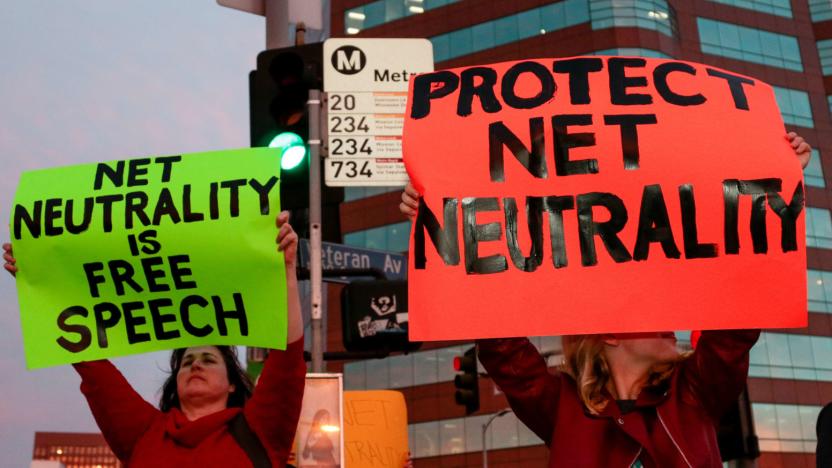EFF
Latest

Seven tech charities to support this holiday season
Here's a list of the best tech charities you can donate to.
Daniel Cooper11.02.2021
Supreme Court asked to review case against border device searches
The ACLU and EFF have asked the Supreme Court to hear a challenge against warrantless phone and laptop searches at borders, including airports.
Jon Fingas04.24.2021
Congress approves COVID-19 spending bill with contentious copyright measures
US Congress has finally passed a new spending bill with COVID-19 relief measures, which on the one hand is good news for many Americans. As often happens with crucial legislation, however, lawmakers tacked on extra legislation, including felony streaming measures and a controversial copyright bill called the CASE Act.
Steve Dent12.22.2020
GitHub revamps copyright takedown policy after restoring YouTube-dl
GitHub has reinstated YouTube-dl after it took down the tool last month.
Igor Bonifacic11.16.2020
How to protect your identity while protesting police brutality
As protests around the country against police brutality continue to expand, law enforcement's reaction grows ever more heavy-handed. Here are some ways to protect yourself and your identity.
Andrew Tarantola06.05.2020
Federal judge rules suspicionless device searches at the border are illegal
Civil liberties advocates just scored an important victory in a bid to prevent arbitrary device searches at the US border. A federal court handling a 2017 lawsuit has ruled that US policies allowing device searches without valid suspicion or warrants violate Fourth Amendment protections against unreasonable searches and seizures. Judge Denise Casper noted that an exemption for searches at the border was "not limitless," and still needed to strike a balance between privacy and government interests. That usually means focusing on contraband, she said.
Jon Fingas11.12.2019
Google, Reddit execs to speak at House hearing on internet moderation
American politicians have been questioning whether internet companies should be held liable for the content they allow, and two of those companies will soon address those concerns directly. Two House subcommittees are holding a joint online content moderation hearing on October 16th where Google IP policy head Katherine Oyama and Reddit CEO Steve Huffman (above) will speak as witnesses. The hearing will both explore existing practices and help determine if customers are "adequately protected under current laws," including the Communications Decency Act's Section 230 safe harbor protections.
Jon Fingas10.11.2019
Ask Engadget: Can the police make me unlock my smartphone?
The support shared among readers in the comments section is one of the things we love most about the Engadget community. Over the years, we've known you to offer sage advice on everything from Chromecasts and cameras to drones and smartphones. In fact, our community's knowledge and insights are a reason why many of you participate in the comments. We truly value the time and detail you all spend in responding to questions from your fellow tech-obsessed commenters, which is why we've decided to bring back our "Ask Engadget" column. This week's question concerns the legal side of technology. Weigh in with your advice in the comments -- and feel free to send your own questions along to ask@engadget.com! What are my rights (as a US citizen) if the police ever ask me to unlock my phone?
Amber Bouman06.29.2019
Sex, lies, and surveillance: Something's wrong with the war on sex trafficking
Silicon Valley's biggest companies have partnered with a single organization to fight sex trafficking -- one that maintains a data collection pipeline, is partnered with Palantir, and helps law enforcement profile and track sex workers without their consent. Major websites like Facebook, Twitter, Snapchat and others are working with a nonprofit called Thorn ("digital defenders of children") and, perhaps predictably, its methods are dubious.
Violet Blue05.31.2019
Starz apologizes for pushing Twitter to remove tweets on online piracy
How about this for a comedy of errors. Last week, Twitter removed a tweet posted by TorrentFreak, for an article about how Starz shows were being pirated. The TV service Starz compounded matters over the weekend after issuing a DMCA takedown to remove other users' tweets that shared the article or even simply referenced the irony of the removal of the first tweet.
Amrita Khalid04.15.2019
How sex censorship killed the internet we love
When was the last time you thought of the internet as a weird and wonderful place? I can feel my anxiety climbing as I try to find current news stories about sex. Google News shows one lonely result for "porn," an article that is 26 days old. I log out of everything and try different browsers because this can't be right.
Violet Blue01.31.2019
Maria Butina: Cybersecurity charlatan, spy
Russian spy Maria Butina's cover story was her academic interest and expertise in cybersecurity. As cover stories go, this unfortunately wasn't a hard one to pull off. Except anyone holding even the barest minimum of cybersecurity knowledge could've figured out in minutes that Butina's interest in cybersecurity was minimal.
Violet Blue12.14.2018
Senate passes bill that lets the government destroy private drones
This week, the Senate passed the FAA Reauthorization Act, which, among other things, renews funding for the Federal Aviation Administration and introduces new rules for airports and aircraft. But the bill, which now just needs to be signed by the president, also addresses drones. And while parts of the bill extend some aspects of drone use -- such as promoting drone package delivery and drone testing -- it also gives the federal government power to take down a private drone if it's seen as a "credible threat."
Mallory Locklear10.04.2018
CA governor signs net neutrality bill into law, Justice Department sues
A net neutrality bill that its sponsor Scott Weiner calls "the strongest in the nation" (after being restored to its original form) is now state law in California after being signed by governor Jerry Brown. SB 822 is intended to restore the protections put in place by a (now-rescinded) 2015 FCC Order, as well as closing "loopholes" that its backers said could have allowed anti-competitive forms of zero-rating. FCC Chairman Ajit Pai captained the effort to repeal those rules, and has called the bill "illegal," setting the stage for a squabble between the state and federal government. And just as quickly as the bill has been signed, the New York Times reports that the Justice Department has filed a lawsuit against it. In a statement, the department claimed "Senate Bill 822, an Internet regulation bill signed into law earlier today by Governor Jerry Brown, unlawfully imposes burdens on the Federal Government's deregulatory approach to the Internet."
Richard Lawler09.30.2018
UK politicians push for FOSTA SESTA-style sex censorship
If you're familiar with the phrase "that's a terrible idea, let's do it" then you might be one of the British MPs who think that the UK should do its own version of FOSTA-SESTA. That's exactly what Labour MP Sarah Champion has done by leading a debate this week for the creation of laws to criminalize websites used by sex workers in the UK -- under the rubric of fighting trafficking, of course.
Violet Blue07.06.2018
The EFF wants to make email servers more secure
The Electronic Frontier Foundation (EFF) launched HTTPS-encryption initiative Let's Encrypt two years ago with Mozilla and Cisco. Now it's turning its attention to email servers with a new project called STARTTLS Everywhere, which aims to help server admins run STARTTLS emails servers properly. Because according to the EFF, most aren't.
Rachel England06.27.2018
‘Efail’ exploit exposes popular email encryption schemes
Encrypted emails guarded by common encryption tools are allegedly "susceptible to critical vulnerabilities" that would expose their content to potential hackers. Sebastian Schnizel, a computer science professor from the University of Münster called attention to the 'Efail' issue on Sunday via Twitter. He subsequently urged users of PGP/GPG and S/Mime software to disable it in their email clients.
Katrina Filippidis05.14.2018
The EFF wants you to know why Facebook removed your post
The Electronic Frontier Foundation (EFF) wants more transparency from social media sites when it comes to takedowns. Much like reports companies issue for government requests, the EFF would like to see Facebook, Google and other platforms issue quarterly reports of how many user posts are removed. The organization would also like to see detailed explanations about said takedowns and for an appeals policy to be implemented "to boost accountability," it writes.
Timothy J. Seppala05.07.2018
Suicide, violence, and going underground: FOSTA’s body count
Maybe you've noticed a sudden flood of updates to Terms and Conditions recently from the internet services you use. A close look at those agreements will show that many are GDPR related, but some are most definitely not. Welcome to the culture of fear, ushered in by the passing of FOSTA-SESTA.
Violet Blue04.27.2018
Senate passes sex-trafficking bill that may lead to online censorship
Today, the Senate passed the controversial Stop Enabling Sex Traffickers Act (SESTA) and the bill now heads to the White House where Donald Trump is expected to sign it. While some groups like the Internet Association have backed the bill, many others have come out against it saying the bill will lead to online censorship and make it more difficult to find and prosecute sex traffickers. Those who've spoken out against SESTA include the National Organization for Women, the ACLU, the EFF, the Department of Justice as well as a variety of sex work rights organizations and sex trafficking victims' groups.
Mallory Locklear03.21.2018